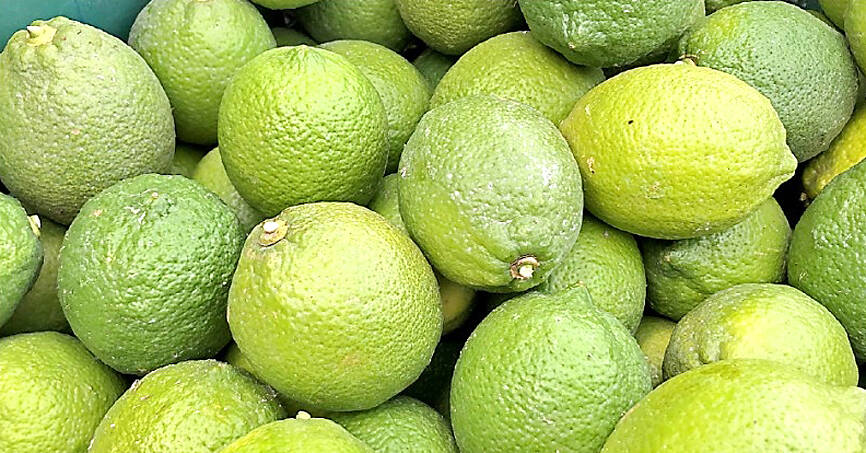The Council of Agriculture (COA) is seeking to reduce the proportion of produce and fishery products exported to China to less than 2 percent, to reduce the anticipated effects of Chinese bans on Taiwanese goods, a source said on Sunday.
China has banned imports of Taiwanese groupers, beltfish, pineapples, citrus fruits and various processed foods and other items over the past year, and more bans are expected, the source said.
The council had already begun shifting exports to the US, Japan and Southeast Asian countries, and would continue to do so, the source said, adding that the Ministry of Economic Affairs was also working on the issue.

Photo: Yang Yuan-ting, Taipei Times
The Economic Cooperation Framework Agreement (ECFA) signed by Taiwan and China in June 2010 in Chongqing, China, laid out 539 items that Taiwan could export to China tariff-free.
However, 18 of those items are now banned from being imported into China, the source said.
“We are not ruling out that China might simply scrap the ECFA to put further pressure on the Democratic Progressive Party,” the source said.
Only the fisheries and agricultural industries are currently affected by the bans, but if the ECFA is scrapped it would impact industries including textiles, machinery, petrochemicals, automotive, dyes, fiberglass, rubber tires and others, the source said.
Taiwan Association of University Professors deputy chairman Chen Li-fu (陳俐甫) said it was unlikely that China would scrap the agreement.
The ECFA “early harvest” list of items that fall under tariff concessions mostly includes electronics, machinery and agricultural products, and China relies on the electronic items on the list, he said, adding that it would harm China to give up on the agreement.
In turn, Taiwan relies on China for manufacturing, and benefits from selling finished and semi-finished products to the Chinese market, he added.
Many Taiwanese businesses have already begun shifting manufacturing to Vietnam, and if tariffs are reinstated on ECFA items, the effects on Taiwan would not be too great, he said.
“China has vast land and abundant resources, and there is no shortage of fruit and fishery products there. The CCP [Chinese Communist Party] used the ECFA to benefit Taiwan as a united front tactic,” he said.
“When the CCP cuts off the money-making channel of Taiwanese farmers, it can create a crisis. Therefore, dependence on the Chinese market for agricultural products must be reduced,” he added.
Chen said that more economic sanctions are possible at any time with Chinese President Xi Jinping (習近平) entering his third term, adding that the government should accelerate the promotion of its New Southbound Policy to encourage the transfer of manufacturing to India, Vietnam and Thailand.
It should also push a transition toward smart industries that create high added value, he said.
Taiwan should also strive to join the Comprehensive and Progressive Agreement for Trans-Pacific Partnership, deepen economic and trade relations with the US through the Taiwan-US Initiative on 21st-Century Trade, and strive for a Taiwan-US free-trade agreement, he said.

Left-Handed Girl (左撇子女孩), a film by Taiwanese director Tsou Shih-ching (鄒時擎) and cowritten by Oscar-winning director Sean Baker, won the Gan Foundation Award for Distribution at the Cannes Critics’ Week on Wednesday. The award, which includes a 20,000 euro (US$22,656) prize, is intended to support the French release of a first or second feature film by a new director. According to Critics’ Week, the prize would go to the film’s French distributor, Le Pacte. "A melodrama full of twists and turns, Left-Handed Girl retraces the daily life of a single mother and her two daughters in Taipei, combining the irresistible charm of

A Philippine official has denied allegations of mistreatment of crew members during Philippine authorities’ boarding of a Taiwanese fishing vessel on Monday. Philippine Bureau of Fisheries and Aquatic Resources (BFAR) spokesman Nazario Briguera on Friday said that BFAR law enforcement officers “observed the proper boarding protocols” when they boarded the Taiwanese vessel Sheng Yu Feng (昇漁豐號) and towed it to Basco Port in the Philippines. Briguera’s comments came a day after the Taiwanese captain of the Sheng Yu Feng, Chen Tsung-tun (陳宗頓), held a news conference in Pingtung County and accused the Philippine authorities of mistreatment during the boarding of

88.2 PERCENT INCREASE: The variants driving the current outbreak are not causing more severe symptoms, but are ‘more contagious’ than previous variants, an expert said Number of COVID-19 cases in the nation is surging, with the Centers for Disease Control (CDC) describing the ongoing wave of infections as “rapid and intense,” and projecting that the outbreak would continue through the end of July. A total of 19,097 outpatient and emergency visits related to COVID-19 were reported from May 11 to Saturday last week, an 88.2 percent increase from the previous week’s 10,149 visits, CDC data showed. The nearly 90 percent surge in case numbers also marks the sixth consecutive weekly increase, although the total remains below the 23,778 recorded during the same period last year,

The Chinese Communist Party (CCP) is pushing for residents of Kinmen and Lienchiang counties to acquire Chinese ID cards in a bid to “blur national identities,” a source said. The efforts are part of China’s promotion of a “Kinmen-Xiamen twin-city living sphere, including a cross-strait integration pilot zone in China’s Fujian Province,” the source said. “The CCP is already treating residents of these outlying islands as Chinese citizens. It has also intensified its ‘united front’ efforts and infiltration of those islands,” the source said. “There is increasing evidence of espionage in Kinmen, particularly of Taiwanese military personnel being recruited by the